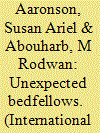|
|
|
Sort Order |
|
|
|
Items / Page
|
|
|
|
|
|
|
| Srl | Item |
| 1 |
ID:
105880


|
|
|
|
|
| Publication |
2011.
|
| Summary/Abstract |
The WTO system and democratic rights are unexpected bedfellows. The GATT/WTO requires governments to adopt policies that provide foreign products (read producers) with due process, political participation, and information rights related to trade policymaking. Because these nations also provide these rights to their citizens, a growing number of people are learning how to influence trade-related policies. As trade today encompasses many areas of governance, these same citizens may gradually transfer the skills learned from influencing trade policies to other public issues. Thus, the WTO not only empowers foreign market actors, but also citizens in repressive states. We use both qualitative and quantitative analysis to examine whether membership in the WTO over time leads to improvements in these democratic rights. Our qualitative analysis shows that these issues are discussed during accessions and trade policy reviews. Quantitative analysis examines how members of the GATT/WTO perform on these democratic rights over time. We use a cross-national time series design of all countries, accounting for selection issues of why countries become members of the GATT/WTO regime. We find that longer GATT/WTO membership leads to stronger performance on our metrics for political participation, free and fair elections, and access to information.
|
|
|
|
|
|
|
|
|
|
|
|
|
|
|
|
| 2 |
ID:
107809


|
|
|
|
|
| Publication |
2011.
|
| Summary/Abstract |
The WTO system and democratic rights are unexpected bedfellows. The GATT/WTO requires governments to adopt policies that provide foreign products (read producers) with due process, political participation, and information rights related to trade policymaking. Because these nations also provide these rights to their citizens, a growing number of people are learning how to influence trade-related policies. As trade today encompasses many areas of governance, these same citizens may gradually transfer the skills learned from influencing trade policies to other public issues. Thus, the WTO not only empowers foreign market actors, but also citizens in repressive states. We use both qualitative and quantitative analysis to examine whether membership in the WTO over time leads to improvements in these democratic rights. Our qualitative analysis shows that these issues are discussed during accessions and trade policy reviews. Quantitative analysis examines how members of the GATT/WTO perform on these democratic rights over time. We use a cross-national time series design of all countries, accounting for selection issues of why countries become members of the GATT/WTO regime. We find that longer GATT/WTO membership leads to stronger performance on our metrics for political participation, free and fair elections, and access to information.
|
|
|
|
|
|
|
|
|
|
|
|
|
|
|
|
|
|
|
|
|